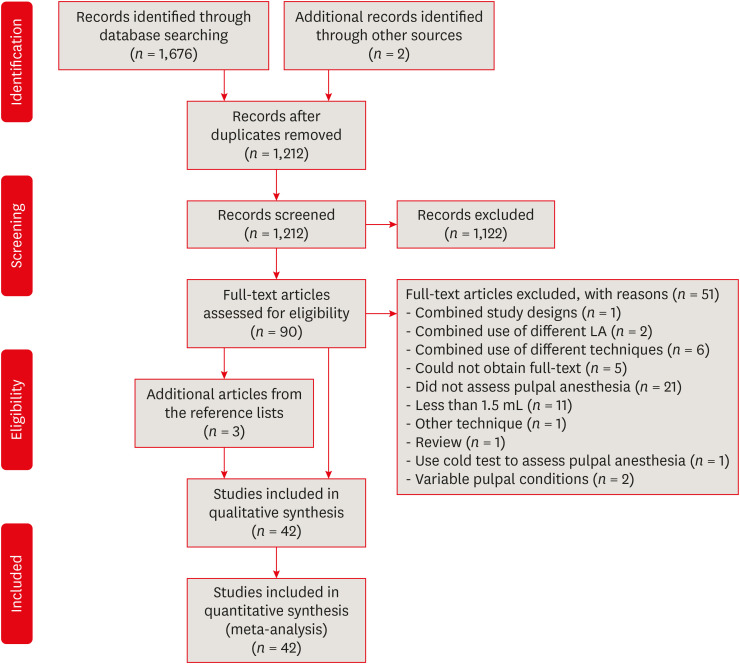Search
- Page Path
- HOME > Search
- Anesthetic efficacy in vital asymptomatic teeth using different local anesthetics: a systematic review with network meta-analysis
- Amy Kia Cheen Liew, Yi-Chun Yeh, Dalia Abdullah, Yu-Kang Tu
- Restor Dent Endod 2021;46(3):e41. Published online July 21, 2021
- DOI: https://doi.org/10.5395/rde.2021.46.e41

-
 Abstract
Abstract
 PDF
PDF Supplementary Material
Supplementary Material PubReader
PubReader ePub
ePub Objectives This study aimed to evaluate the efficacy of various local anesthesia (LA) in vital asymptomatic teeth.
Materials and Methods Randomized controlled trials comparing pulpal anesthesia of various LA on vital asymptomatic teeth were included in this review. Searches were conducted in the Cochrane CENTRAL, MEDLINE (via PubMed), EMBASE, ClinicalTrials.gov, Google Scholar and 3 field-specific journals from inception to May 3, 2019. Study selection, data extraction, and risk of bias assessment using Cochrane Risk of Bias Tool were done by 2 independent reviewers in duplicate. Network meta-analysis (NMA) was performed within the frequentist setting using STATA 15.0. The LA was ranked, and the surface under the cumulative ranking (SUCRA) line was plotted. The confidence of the NMA estimates was assessed using the CINeMA web application.
Results The literature search yielded 1,678 potentially eligible reports, but only 42 were included in this review. For maxillary buccal infiltration, articaine 4% with epinephrine 1:100,000 was more efficacious than lidocaine 2% with epinephrine 1:100,000 (odds ratio, 2.11; 95% confidence interval, 1.14–3.89). For mandibular buccal infiltration, articaine 4% with epinephrine 1:100,000 was more efficacious than various lidocaine solutions. The SUCRA ranking was highest for articaine 4% with epinephrine when used as maxillary and mandibular buccal infiltrations, and lidocaine 2% with epinephrine 1:80,000 when used as inferior alveolar nerve block. Inconsistency and imprecision were detected in some of the NMA estimates.
Conclusions Articaine 4% with epinephrine is superior when maxillary or mandibular infiltration is required in vital asymptomatic teeth.
-
Citations
Citations to this article as recorded by- Anatomical Basis of the Palatal Injection Technique for Pulpal Anesthesia of Maxillary Teeth
Sergey Kabak, Joe Iwanaga, Yuliya Melnichenko, Ruslan Mekhtiev, Nina Savrasova
Clinical Anatomy.2025;[Epub] CrossRef - Adrenaline in pulp capping treatment of reversible pulpitis
Si-Yun Yang, Jin-Zhu Wang, Hao Fan, Min Chen
World Journal of Clinical Cases.2024; 12(22): 5024. CrossRef - Effect of 810 nm Diode Laser Irradiation on the Time of Initiation and Depth of Anesthesia for Endodontic Treatment of Mandibular First Molars with Symptomatic Irreversible Pulpitis: A Clinical Trial
Elham Khoshbin, Leila Ghasemi, Rooholah Behroozi, Zahra Khosravi, Afsaneh Rahmati, Loghman Rezaeisoufi, Hamed Karkehabadi
Photobiomodulation, Photomedicine, and Laser Surgery.2023; 41(9): 475. CrossRef - The potential of articaine as new generation of local anesthesia in dental clinics: A review
Wen Luo, Kaiyue Zheng, Huifang Kuang, Zhixin Li, Jinrong Wang, Jie Mei
Medicine.2022; 101(48): e32089. CrossRef
- Anatomical Basis of the Palatal Injection Technique for Pulpal Anesthesia of Maxillary Teeth
- 3,983 View
- 37 Download
- 3 Web of Science
- 4 Crossref


 KACD
KACD

 First
First Prev
Prev


